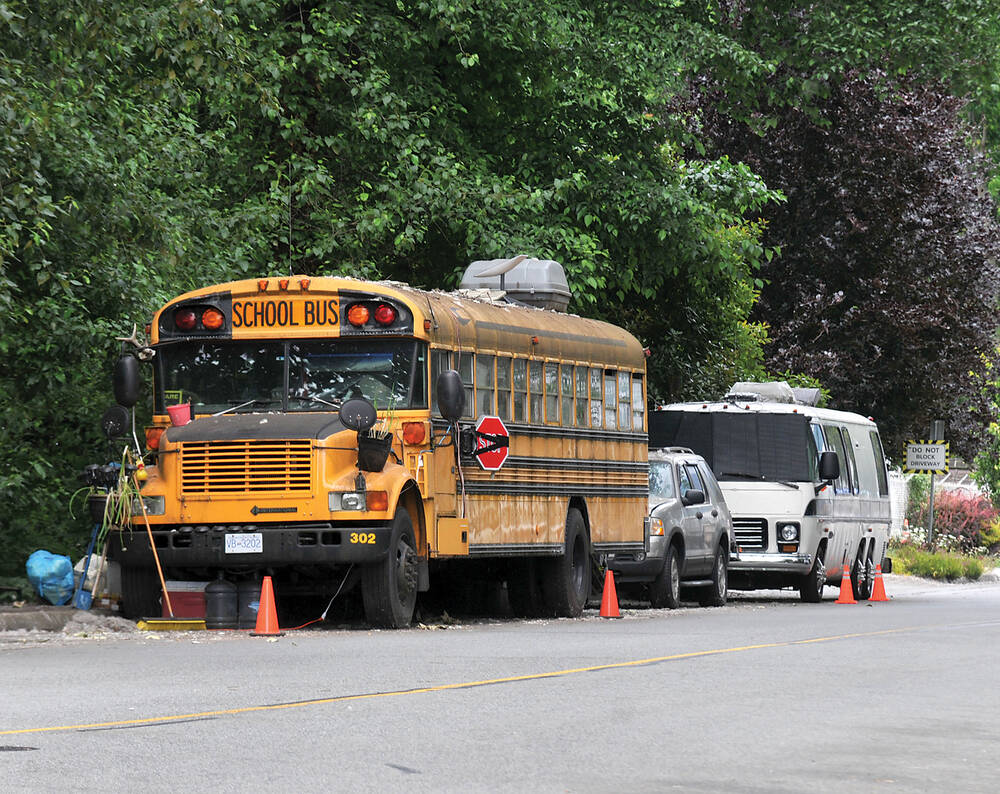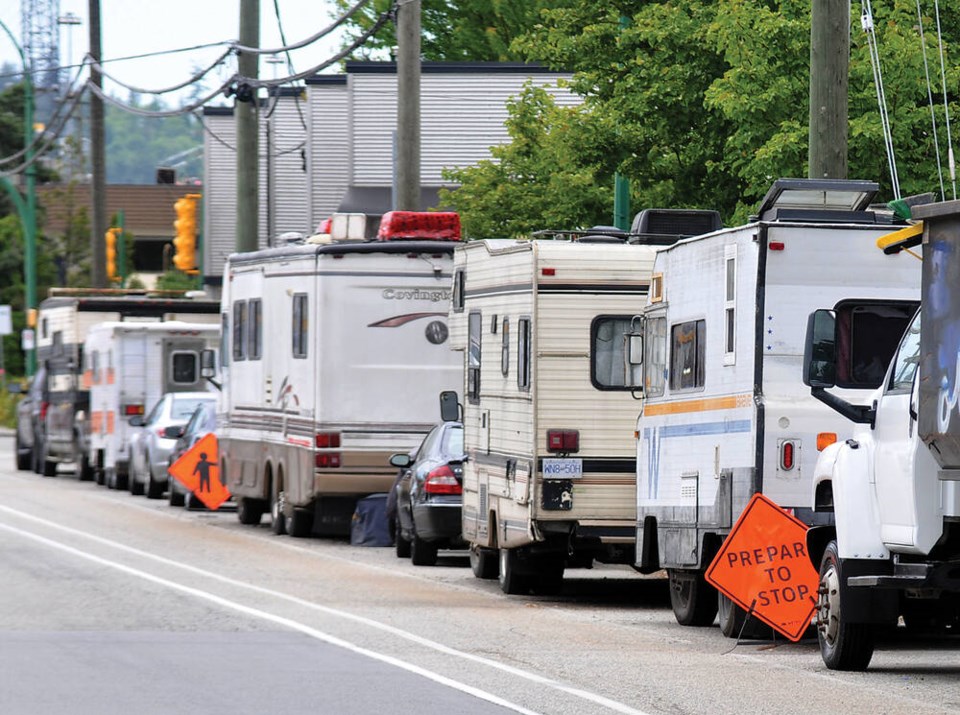The District of North Vancouver is preparing to crack down on people who park large recreational vehicles on public streets.
The municipality has been facing growing calls from property owners, especially around Lloyd Avenue and Mackay Creek, to enforce parking and street bylaws that would force RV owners to move their vehicles elsewhere.
When staff surveyed the streets earlier in the year, they found 76 such vehicles. A more recent scan found that number dropped to 59, but staff say the issue is trending worse, not better, over a longer timeframe, and there have been mounting complaints about safety, sanitation and public disorder.
It’s a difficult issue, staff acknowledged at council's June 9 meeting, as RVs could be parked on the street for highly disparate reasons – being stored empty by local residents, being used as provisional housing by seasonal or temporary workers, or being used as permanent homes by people who truly can’t afford anywhere else to be.
At the meeting, district council debated numerous options ranging from more education and homelessness outreach to putting stricter parking limits on known hotspots, and ticketing and towing.
“The reality is, we kind of need to do all four.… I don’t think that maintaining the current status quo on this is going to be satisfactory,” said Mayor Mike Little. “It’s frustrating for people to access public facilities such as the tennis centre down on Lloyd. It’s created an unsafe environment. One of my daughters works in the general neighbourhood and always feels quite unsafe walking through that area, and I’m sure that’s representative of the experience of a lot of people in our community in those spaces.”
After speaking with several RV dwellers likely to be caught up in enforcement, Coun. Herman Mah noted there were some who would not fall under the traditional definition of “homeless.”
“As a Canadian society, compassion has been one of our key attributes, however, that compassion is not endless if we feel that some people might be taking advantage of that and not following the rules as we as a society have established,” he said. “In my opinion, the number of RVs and large vehicles exceeding 72 hours parking has reached a tipping point.”
Coun. Jim Hanson agreed it was time for a crackdown, but also floated the idea of finding a space for sanctioned RV parking where residents would have access to water, sanitation and electric services.
“It is not fair for our community to have people living in RVs on our streets, and it should be enforced and it should be stopped. At the same time, it’s not fair to tell people who cannot afford better housing that they cannot park in our district when there is nowhere else for them to go,” he said. “If we face charges for creating the type of space that these people need, I suggest we send the bill to the provincial government, because it’s their responsibility to address this problem, and it’s their lapse that is creating this problem.”

RV dwellers respond to North Vancouver council
Although no one from the RV community was present at the meeting, word spread along Lloyd Avenue soon after.
Deborah, who asked that her surname not be used, said she and her husband are in the process of moving to a permanent home at a trailer park in Hope after five years of pressure to get off the North Shore.
“My first choice is not to live in Hope. My first choice is to live right here. But I am so sick and tired of the harassment from bylaws, from police, from citizens,” she said.
Although she and her husband will fare just fine, Deborah said she worries for a lot her neighbours if their community is forcibly broken up and displaced to locations where they won’t have access to electricity, water and the support they need.
“I think it’s very mean-spirited to treat these people like they’re the plague or something less than human, because most of them have a really good soul. I think mostly it’s mental health issues that prevent them from either working or maintaining a job,” she said. “If they shove them into the abyss of nothingness, how are they going to survive?…Where are they going to go when every single place you turn to, they don’t want you?”
It’s not the staying in an RV that makes life miserable, said RV resident Lucky Sanang, but living with a constant feeling of being unwelcome and never knowing when bylaw officers or police might come and take their only home away.
“I think it’s not fair, really, because a lot of people are in situations that they can’t get out of,” he said. “It’s not like I like it 100 per cent, but I choose to live like this for organic reasons and a peaceful way of getting myself out of my mental problems and health problems at the same time.”
Forced relocations only make their mental health problems worse, he added.
“I’m a human. I’m not a goose. I don’t migrate,” he said. “Every change just brings you back down.”
Another RVer, who goes by the name Freedom, said he’d like to see society start looking to RVs as a solution in the housing crisis, not a symptom of it. Small, sanctioned RV parking areas would do just that, he added.
“If they put us in SROs with bedbugs and places where we’re getting robbed and stuff like that, you’re not giving us a better option. You’re not giving us any option at all,” he said. “I think it would be better for the government to work with the RVers instead of against them.”
One of the offices located right in the thick of the neighbourhood with the most RVs is the Harvest Project, a non-profit that works to get people out of poverty and into stability. Development officer Kevin Lee said he doesn’t share council’s urgency to see people moved along. It is a complex issue, Lee acknowledged, but he said those who are experiencing the greatest disadvantage are not the property owners calling for more enforcement.
“If you look at the number of folks that are living in the area, it’s remarkably tidy. It’s remarkably well self-policed – as well as any neck of the woods on the North Shore,” he said. “It’s a pain in our conscience that folks are not are not being well provided for in our society.”
The municipality might also be overlooking the benefits that come from having RVers living as a close-knit community, the RVers said. While living along the Mackay Creek corridor, Freedom and Sanang have pulled heaps of trash out of the riparian area and intervened to stop break-ins from happening. Deborah’s husband, who works as a chef, makes big pots of soup to share with their neighbours who might otherwise go hungry.
“Sometimes RVers bother people’s eyes,” Sanang said. “It’s not good to judge people and to dismantle them and then just kick them out with no solution. That’s what’s happening right now.”
[email protected]
twitter.com/brentrichter
brentrichter.bsky.social
Want to stay updated on North Vancouver and West Vancouver news? Sign up for our free daily newsletter.



